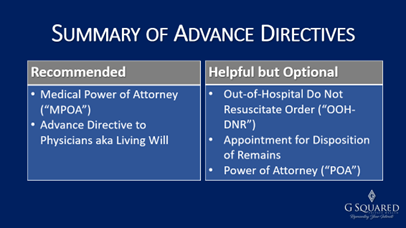November 2023 Market Brief
End of Life Planning Using Advance Directives
“It’s not contagious, you know. Death is as natural as life. It’s part of the deal we made.” Mitch Albom
Thinking about a loved one passing can be uncomfortable and emotional. And yet, at some point during our lives, all must confront it as the only sure things in life are death and taxes. One of the most compassionate actions we can do for our loved ones is to plan ahead for our last days and to talk to our family about our wishes. Estate planning typically involves numerous documents, which all have different functions, so it is important to understand what each document covers and when it may need to be used.

- Medical Power of Attorney (“MPOA”): The general purpose of a MPOA is to appoint an agent to make health care decisions for the individual in accordance with the individual’s wishes if the individual is unable to do so because of mental or physical incapacity.
- Advance Directive to Physicians aka Living Will: With an Advance Directive to Physicians, an individual directs medical professionals to withhold life sustaining treatment if the individual is terminally ill or has an irreversible condition.
- Out-of-Hospital Do Not Resuscitate Order (“OOH-DNR”): This form directs medical professionals in an out-of-hospital setting to withhold resuscitation attempts or other life-sustaining procedures. It is generally only used when an individual is very ill and death is imminent.
- Appointment for the Disposition of Remains: This form appoints an individual to control burial, funeral, and memorial arrangements. As difficult as these decisions are, focusing on these arrangements before death can eliminate stress and strife on loved ones during a time when they may be grieving.
- Power of Attorney (“POA”): Although this form doesn’t involve health decisions, an individual (the principal) can appoint agent(s) to take certain actions regarding the individual’s property, including the power to make gifts and engage in financial planning. There are generally two types of POAs: general and limited. General POAs grant an agent very broad powers to act on the individual’s behalf. Limited POAs limit the agent’s powers to those specifically granted in the document. Be aware that a General POA terminates when the individual becomes incapacitated, so they are not ideal for end of life planning. A Durable POA, on the other hand, takes effect upon or continues to be valid if the individual becomes mentally or physically incapacitated.
I encourage clients to consult estate planning attorneys for comprehensive estate plans. However, if you don’t already have Advance Directives in place, you may want to see if your state offers statutory forms online. Texas, for example, has many statutory forms online on the Texas Health and Human Services website under “Advance Directives” – https://www.hhs.texas.gov/formas/advance-directives.